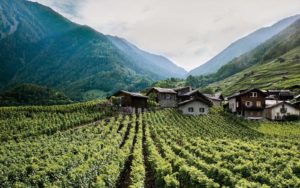[A sermon on Amos 9.7-15 preached in the second week of Advent
at Wine Before Breakfast]
From lament to hope.
From sorrow to comfort.
From judgement to forgiveness.
From death to life.
From collapse to renewal.
From exile to home.
From fasting to feasting.
These are the dynamics of biblical faith.
This is the dance of biblical spirituality.
And we have entered the dance this semester
with the conviction that the dance is always
on the way to hope.
Lament is crucial,
but lament is never the last word.
Without sorrow, our heads are in the sand,
but sorrow is never the last word.
Judgement is necessary for historical justice,
but judgement is never the last word.
The wages of sin might well be death,
but death is never the last word.
Political and ecological collapse is upon us,
but collapse is never the last word.
We live in an age of homeless exile,
but exile is never the last word.
Fasting is an act of discipline and repentance,
but fasting is never the last word.
Something like this is playing out in these
closing oracles of the prophet Amos.
What begins in judgement ends with a party.
But the devastation of the judgement
(and devastating it is!)
is no match for the party that is to come.
Yes, there will be a destruction, says this oracle,
but it will not be an utter and total destruction.
Indeed, out of the ruins, out of the collapse,
out of the tearing of the very fabric of social,
economic, political and ecological life,
there will be restoration.
But this will be no mere national restoration.
This is no Make Israel Great Again movement.
Rather, the prophet sees a society and community,
of expansive inclusiveness
emerging out of the ruins.
Yes, alienated members of Israel will be reunited,
but the nations will be welcomed in.
Beyond an ethno-nationalist vision of patriotic exceptionalism
which will always close in on itself in xenophobic anxiety,
here is a vision of protective care and love for all.
No wonder St. James appealed to this text in Acts 15
as legitimating the welcome of the gentiles into the early church.
But just as there is no political crisis in our time
divorced from the ecological threat under which we live,
so also is there no social or political restoration for Amos
apart from an ecological and agrarian renewal.
There is no hope for human culture
without hope for the restoration of creation.
And so Amos envisions a day of abundant fruitfulness
in which the land is so fertile, so productive,
that you can hardly keep up with the harvest,
and the grapes for fermentating are so abundant
that the mountains are dripping with wine
and the hills are overflowing with fine vintages.
Quite the vision for tee-totalling Amos.
There was a time for sober reflection
and total abstinence,
but the day that is coming will not be that time!
A restored social order,
an overflowing ecological and agrarian renewal,
and then, finally, a vision of rebuilt cities for inhabitation.
That’s the heart of this urban vision of hope.
Cities for inhabitation.
Cities of welcome and security.
Cities where people can most profoundly
and redemptively be at home.
That’s the dream,
and when you look at what Amos is dreaming,
you see that it all comes together in this urban vision.
Agrarian and ecological renewal is at the very heart of this city.
Again, the language is of vineyards, gardens and land.
Maybe that’s the heart of it, my friends.
To have no place, no home,
no sense of grounding in life
is to despair.
Divorced from land, there is no hope.
Literally, without some connection to land,
to forests, wild places and domesticated spaces,
to gardens and greenspaces,
we will find ourselves devoid of hope.
Hope is a matter of finding our place,
of coming home,
of knowing that we belong,
that we have a calling,
gifts to share.
Hope is impossible without a deep sense of being landed.
And hope is impossible if you never get dirt
under your fingernails.
That’s why we’ve never offered heaven as a site for our hope
during this semester of looking for hope before breakfast.
No, if there is to be hope, it must be here,
in this time and this place.
That is why God says through this prophet that
the Holy One will plant us upon our land,
never again to be plucked up,
to be stripped of our place in this good creation.
Beloved siblings in Christ,
I believe in this vision of hope
with all of my heart.
And I believe that we enact hope,
we really embrace hope,
indeed we only fully live in hope,
when we take this vision as our own now.
Yes, this is a vision of what is to come,
but to believe it is to claim it now,
and to live in this hope as if it was already here.
There is a rebuilding project under way,
there are doors that need to be opened,
and folks who need to be welcomed.
There is land to be cultivated,
parties to be thrown,
and food and wine to be shared.
Embrace this hope, dear friends.
Live this hope.
Embody this hope.
Receive this hope as a radical gift of liberation.
Share this hope with each other.
Be hope to each other.
And rest, dear siblings, rest in this hope.
Amen
